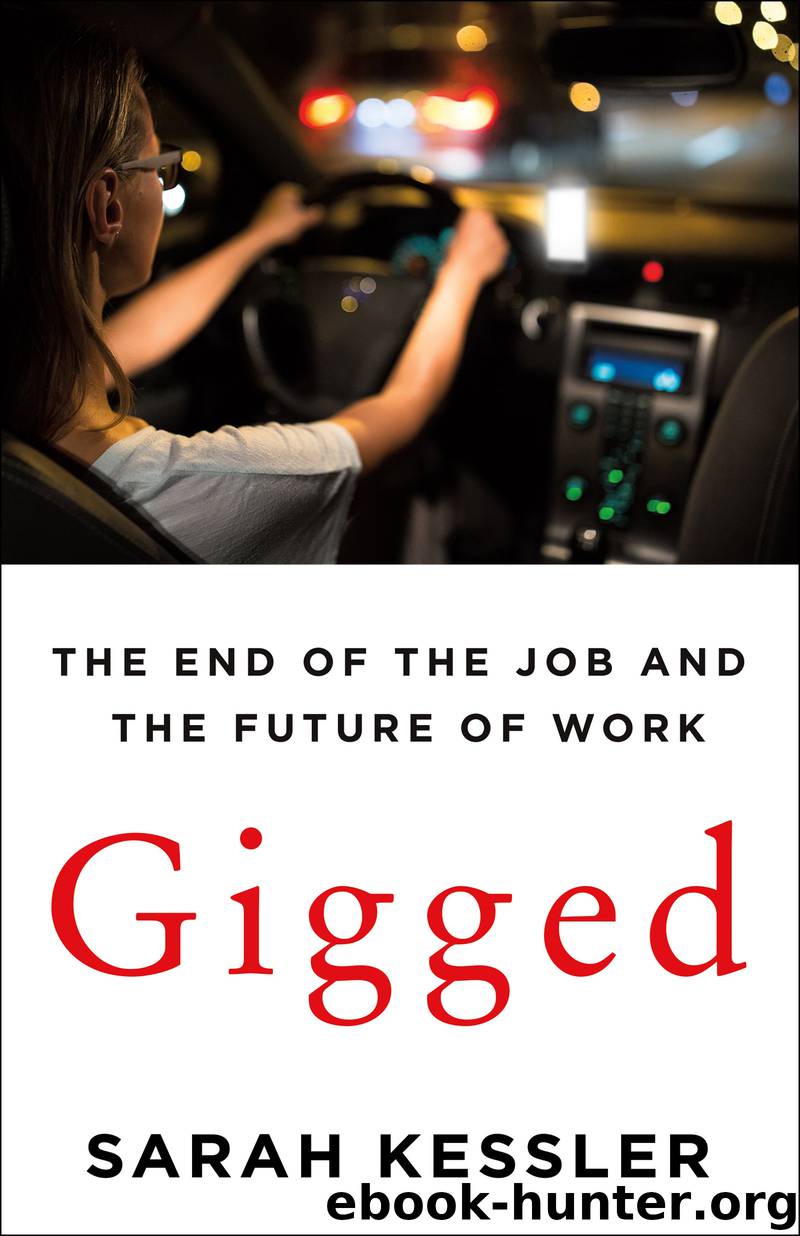Gigged by Sarah Kessler

Author:Sarah Kessler
Language: eng
Format: epub
Publisher: St. Martin's Press
CHAPTER 11
UBER FOR POLITICS
Politicians noticed the gig economy and its promise to shape the future of work sometime around 2015.
That September, I met Mark Warner, the senior US senator from Virginia, in New York City, at one of those hole-in-the-wall delis that serve coffee in Styrofoam cups. Warner, a tall man, conservatively dressed in a dark suit, was seated so close to a cooler that he had to move his stainless steel chair every time someone wanted to buy an orange juice.
The senator was as well positioned as anyone in Congress to understand the changes wrought by the gig economy. Before becoming a politician, he’d been a venture capitalist, making a fortune by investing in early wireless phone businesses. A Democrat who shared his party’s concerns for working people’s rights and wages, he was also the third wealthiest man in Congress. He’d positioned himself as both pro-business and pro-workers, and he’d gotten in touch with me after I’d written an article about how the realities of working in the gig economy didn’t live up to the pitch.
Over the last several months, Senator Warner and his staff had met with gig economy executives from a range of companies including Lyft, Postmates, and Handy. He’d also been hosting round-table conversations with gig economy workers in Virginia. “Eight or nine months into this,” he told me, “I’m more sure than ever that this is a fundamental shift in the economy and is going to accelerate.”
In 2015, only about 0.5% of all US workers had participated in Silicon Valley’s labor revolution.1 (In the UK, the percentage was higher: The Chartered Institute of Personnel and Development estimated in 2017 that 4% of all UK workers have participated in the gig economy.2) Warner knew that the startup world’s version of the gig economy was still, in the context of the wider economy, only as big as a rounding error. It was so small that companies often wondered out loud why journalists, and now politicians, worried so much about its impact. But he didn’t really have much sympathy for that argument. “You can’t have it both ways,” he argued. “You can’t say, ‘give me this valuation as I’m pitching this world transformation,’ and then say, ‘why are policy makers interested?’ When Airbnb has more rooms than Marriott, and Uber has 250,000 drivers and dramatically disrupts a market, it will attract attention.”
The gig economy’s outsized influence and growth trajectory were one reason Mark Warner had to be interested in this small subset of startups. The second was that the gig economy made a perfect vehicle for talking about a problem that stretched beyond Silicon Valley. At the heart of it was a new status quo throughout the United States and much of the world: Risk had migrated from companies to workers.
This was true of those who had watched their employment opportunities, over decades, become increasingly fractured into a web of contractors, freelancers, temps, and other non-traditional employment. It was also true of employees with full-time jobs, who, unlike
Download
This site does not store any files on its server. We only index and link to content provided by other sites. Please contact the content providers to delete copyright contents if any and email us, we'll remove relevant links or contents immediately.
| Anthropology | Archaeology |
| Philosophy | Politics & Government |
| Social Sciences | Sociology |
| Women's Studies |
The Secret History by Donna Tartt(19002)
The Social Justice Warrior Handbook by Lisa De Pasquale(12177)
Thirteen Reasons Why by Jay Asher(8874)
This Is How You Lose Her by Junot Diaz(6857)
Weapons of Math Destruction by Cathy O'Neil(6248)
Zero to One by Peter Thiel(5767)
Beartown by Fredrik Backman(5717)
The Myth of the Strong Leader by Archie Brown(5482)
The Fire Next Time by James Baldwin(5409)
How Democracies Die by Steven Levitsky & Daniel Ziblatt(5200)
Promise Me, Dad by Joe Biden(5130)
Stone's Rules by Roger Stone(5065)
A Higher Loyalty: Truth, Lies, and Leadership by James Comey(4937)
100 Deadly Skills by Clint Emerson(4900)
Rise and Kill First by Ronen Bergman(4761)
Secrecy World by Jake Bernstein(4727)
The David Icke Guide to the Global Conspiracy (and how to end it) by David Icke(4685)
The Farm by Tom Rob Smith(4489)
The Doomsday Machine by Daniel Ellsberg(4474)
